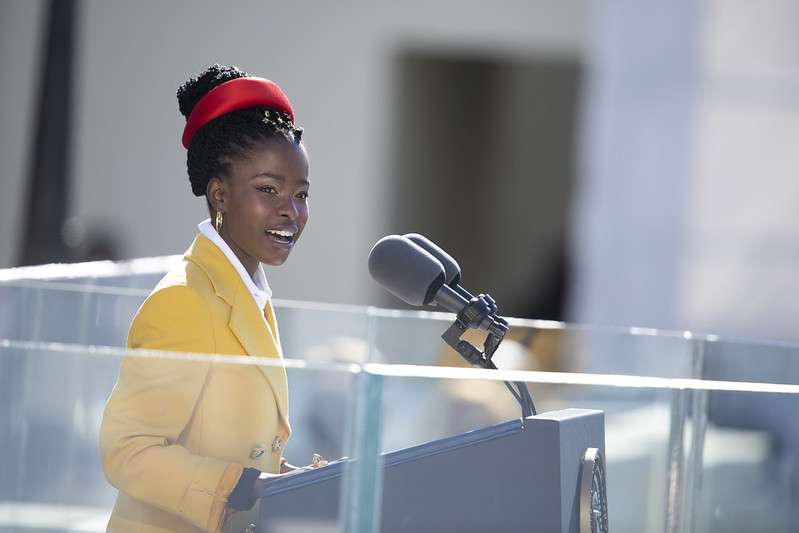
Poet Amanda Gorman’s famed work, “The Hill We Climb,” has landed on the ever-growing list of banned books in America.
This week, officials at a Miami-Dade County public school revoked access to the poem, which Gorman wrote and read at President Joe Biden’s 2021 inauguration, to younger students. The decision was made following a parental complaint about references to so-called “indirect hate messages” within the text, according to the Miami Herald.
Now, Gorman’s poem, along with three other books the local mother objected to, will only be available to students above eighth grade. Officials told the paper that Gorman’s work, and the others on the restricted list, are “better suited” or “more appropriate” for older children – despite acknowledging that one of the other reportedly objectionable books was written for 5-year-olds.
The 25-year-old writer and activist posted a public response to the decision, admitting that she was “gutted” by the call. “I wrote ‘The Hill We Climb’ so that all young people could see themselves in a historical moment,” Gorman said. “Ever since, I’ve received countless letters and videos from children inspired … to write their own poems.”
She added, “Robbing children of the chance to find their voices in literature is a violation of their right to free thought and free speech.”
On Twitter, Gorman subsequently shared the original complaint – in which the parent claims the poem “cause[s] confusion and indoctrinate[s] students,” while incorrectly naming the author as media mogul Oprah and admitting she has not read reviews of it. “Unnecessary #bookbans like these are on the rise, and we must fight back,” Gorman noted.
The National Youth Poet Laureate also spoke out against the broader push to ban books throughout schools and libraries in the United States in her statement, citing a 40% uptick in book challenges from 2021 to 2022. Indeed, over 2,500 titles were contested in all last year, according to a report from the American Library Association.
“Their aim is to suppress the voices of those traditionally excluded from our nation’s conversations, such as people in the LGBTQIA+ community or people of color. Each attempt to ban a book by one of these groups represents a direct attack on every person’s constitutionally protected right to freely choose what books to read and what ideas to explore,” said Deborah Caldwell-Stone, a director at the ALA, in a release on the study.
“The choice of what to read must be left to the reader or, in the case of children, to parents. That choice does not belong to self-appointed book police,” she continued.
For her part, Gorman is not accepting this ban – or any book bans – quietly. In addition to the public statement, she is joining her publisher, Penguin Random House, and literacy nonprofit PEN America in an ongoing lawsuit against Florida’s Escambia County School Board.
“In a nation built on free speech, this cannot stand,” PEN America CEO Suzanne Nossel said in a press release on the case. “The law demands that the [district] put removed or restricted books back on library shelves where they belong.”
Gorman is also encouraging people throughout the U.S. to “speak out and have our voices heard” in the face of book bans and restrictions – because “[t]ogether, this is a hill we won’t just climb, but a hill we will conquer.”



